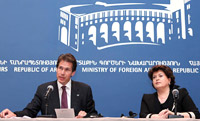The initial meeting on the negotiations on the Association agreement between the Republic of Armenia and European Union recently took place in Yerevan.
Hardly this information may interest many Armenians because due to objective and subjective reasons most of them are not interested in the official relations with Europe, especially different meetings and projects. However, these negotiations and the success stemming out from it will have a positive influence on the majority of Armenia’s population. The Associated agreement will really open a new window for the relations between Armenia and Europe. The main document regulating the relations between Armenia and Europe, the agreement on partnership and cooperation, was enforced on July 10, 1999, for a term of 10 years. After the termination of the term it is automatically prolonged for one year. This agreement is going to be replaced with the Association agreement, which will reflect the policies of cooperation on economic integration, free movement and energy issues.
Armenian ordinary citizens are mostly interested in the opportunity of free movement to be enabled to travel in Europe without any difficulties. Definitely the most important component is the economic part. An agreement on in-depth and compound free trade relations, which will open a new window to the European market for Armenian businesses. Currently Europe is the largest trade partner for Armenia. Even though the trade circulation reduced during the past year due to the world crisis, according to the official statistics, during 2009 the trade circulation between Armenia and the EU countries exceeded $1.2 billion and reached the 30% of the entire trade circulation. During the past 5 years the trade circulation between Armenia and EU grew by 2.5 times. This capacity is so high in condition when Armenia is not enjoying the 0% customs payment benefits like Russia is doing. Also, there are a lot of obstacles connected with documents, information, etc. Till 2009 Armenia was enjoying the General System of Privileges (GSP) trade regime, which was replaced with GSP+ regime in January enabling the participant countries to export 6400 types of products to European markets without any customs payment or reduced payment. This regime will be in force till the end of 2011. In 2007 the European Commission conducted a research and concluded that it was time to sign an in-depth and compound free trade agreement with Armenia. It shall include all spheres (products and services trade, investments, competition, procurement), and shall include institutional reforms as well. In 2009 the CoE fact-finding mission analyzed all the institutions in Armenia which would be involved in the future agreement and developed recommendations for Armenia to do to meet the requirements.
In fact Europe is not against the cooperation with Armenia on equal basis. Even more, they don’t exclude the possibility that Armenia may join the EU. However, there are certain conditions and in order to be a part of their system Armenia should comply with a number of standards in the sector of education, justice, business, legal system, etc. By the way, they don’t develop conditions only but support as well to meet those requirements as fast as we can. For example, in 2009 the EU advisory group started working in Armenia and their experts are collaborating with different ministries to solve concrete problems.
Everything is about our efforts and if we fulfill those requirements, Europe will open the doors for us, if no, we cannot blame anyone for failures. It is logical that Europe wants to see an equal partner with the same values. It seems that is not a big problem for us as we believe we are Europeans. “Since the independence of Armenia the European direction has been one of the main privileges of our foreign policy. We attach importance to the development of the relations with the European Union. From this prospective the Eastern Partnership for developing new quality contractual relations the European Union, especially through the Association agreement, which is in process now,” said the Armenian foreign minister Edward Nalbandyan. However, unlike these assurances since Armenia joined different conventions and agreements it has gone far from Europe and the European values. “The European land is as old as the relations of the Armenian people with Europe. These relations have started long ago many centuries ago when our ancestors used to take part in the process of forming the system of values which is called European values now,” said the Armenian foreign affairs minister.
The fact is that the negotiations have started. For the purpose of organizing the process of negotiations president Serzh Sargsyan signed an order on July 15, 2010, according to which the coordinator of the negotiations from the Armenian side would be Edward Nalbandyan, and the main negotiator would be deputy foreign affairs minister Karine Ghazinyan. The coordinator of the affairs related to justice is justice deputy minister Nikolay Arustamyan, and the coordinator of the financial affairs is deputy minister of finance Mushegh Tumasyan.
Experts say such negotiations are lasting for about 1-2 years. In consideration of the experience of the past 20 years, people don’t believe that in a short period there may be reforms to the extent of complying with European standards. In other words, the group of negotiators representing our country will try hard to represent their wishes like the reality to move forward.

